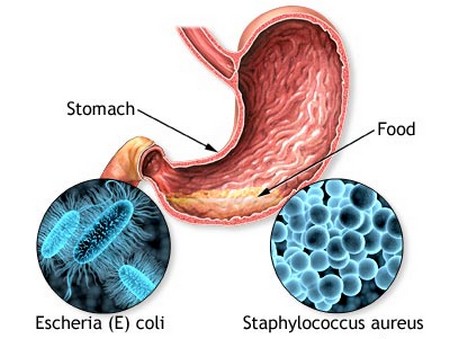Food poisoning is caused by earing contaminated food. This can be food that has not been cooked properly or thoroughly defrosted, or contains bacteria passed on by hands that have not been washed before handling the food. Symptoms, which usually appear after between one and forty-eight hours, include stomach cramps, diarrhoea, raised temperature, loss of appetite and vomiting. The most common bacterium are salmonella (found in poultry, eggs and egg products such as mayonnaise), Campylobacter (found in unpasteurized milk and cheese and in poor hygienic conditions), listeria (found in soft and blue cheeses, some types of pate and cook-chill and ready-to-eat meals), and E. coli, which can cause poisoning in babies who have drunk from unsterilized or poorly sterilized bottles. Foods that have been in water contaminated with human excrement, such as shellfish, can also be a cause. Children can also be poisoned by eating poisonous plants or fungi.
Food poisoning is serious in babies as the accompanying symptoms of vomiting and diarrhoea can lead to dehydration and, in severe cases, be fatal.
What you can do
Make sure your child drinks plenty of fluids, but avoids solids. To prevent dehydration, give rehydration solutions containing salt and glucose. These can be bought from chemists, or you can make up your own, by mixing one level teaspoon (5ml) of salt and eight level teaspoons (40ml) of sugar to two pints (one litre) of cooled boiled water, to be drunk throughout the day. Get rid of any foods that you feel may be the cause of the food poisoning. Slowly reintroduce simple solid foods, such as soups and bananas or plain rice and avoid milk until symptoms have eased.
For future prevention you should always:
- wash your hands before handling food and after handling raw meat
- rinse fresh fruit and vegetables before cooking and eating
- use a separate chopping board for cutting meat
- thoroughly defrost food before cooking
- thoroughly cook or reheat any meals, particularly those containing meat
- refrigerate all cooked food and check your fridge is cold enough (below 10°C).
Treatment
Medical attention should be sought, but the following complementary therapies may also be beneficial:
Homoeopathy
A practitioner may prescribe Bryonia for the vomiting and diarrhoea and if the child feels discomfort with every movement. If the child is feeling particularly weak and is suffering from vomiting and diarrhoea, especially at night, China may be prescribed. If a baby feels cold and resdess and obviously unwell, Arsenicum may be advised.
Traditional Chinese medicine
Treatment will depend on the type of poisoning. If it is as a result of seafood poisoning, ginger, Chinese olive and reed grass may be prescribed. For fighting against the types of bacteria found in improperly defrosted, undercooked food or in unhygienic conditions Mishmi bitter may be used. Garlic may also be recommended. Chinese ‘Pochai pills’ may be given to deal with the food poisoning and food stagnation.
Naturopathy
A naturopath would recommend avoiding all solid food until the symptoms had eased and that the child sip at least one to two pints to 1 litre) of water a day. Ginger tea may also help to calm the stomach. Once the symptoms have eased, dry white toast may be nibbled. Then more solid, but simple food can be slowly introduced such as brown rice or some fruit or vegetables. To help give support, mineral salt supplements may be recommended, such as potassium chloride, iron and magnesium phosphate and sodium sulphate. After vomiting, your child’s natural balance of bacteria in the gut may be disturbed, so a probiotic supplement such as acidophilus and bifidus may be recommended or that you give your child a natural probiotic supplement lollipop or live yoghurt which contains bacteria necessary for the bowel.
Caution
If your baby has been suffering from diarrhoea and vomiting for more than six hours, seek medical attention to prevent dehydration.

